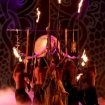"I always grew up with the question of belief," says Heilung's throat-singing vocalist Kai Uwe Faust. "Believing in Jesus Christ or not, believing in the Devil. But when I healed in front of my eyes, it wasn't a question of believing anymore — I experienced it."
Fittingly, the Heilung experience is defined by a sense of restoration. The experimental folk act's German name translates to "Healing" in English, and it's a suitable choice, given the intensity of their transfixing soundscapes and ritualistic live shows — where musicians dress up like tribal ancients with antlers and furs, wielding human bones and pounding drums covered in animal skins. The Danish trio's material — including their second LP, Futha, and their hypnotic live clips, many of which have been viewed millions of times — also has a shamanistic effect, putting one at ease through chants and drones. But the concept of healing resonates on an even deeper, more personal, level for Faust.
The musician was a bit more rebellious than most teenagers: rejecting his family's strict Christian upbringing in Germany, becoming destructive and combative in school, diving into Satanism. At age 14, years before becoming a figurehead of the neo-Nordic tattoo revival, he even displayed his devotion to the dark deity by tattooing an upside-down cross onto his body. And as conflict reigned in his personal life, he also struggled with health issues, battling a psoriasis-type skin disease that caused maddening irritation, itching and rashes.
Then, around age 17, his entire perception of the universe changed after attending a regional midsummer ceremony. There he met a "shamanic worker" who invited him to join a "healing trance journey," an event he now calls a "golden gate opening up into [his] world." Everything that followed in his life narrative — Heilung, his own tattoo career, his outlook on the earth and spirituality — was cinematically set in motion from that moment.
"I was still rooted in my Satanism and had the Nordic interests, the 'God of the Dead' kinda thing," he says. "All this incense and hand-holding kinda stuff, it was a bit weird for me. My girlfriend at the time was really into that, so I thought, I'll just follow along with their drumming and everything. ... They said that in order to perform a healing trance journey, they would need someone who required healing. I'd gone to a couple doctors [for the skin problems], and they wanted to give me some weird stuff like Cortisone ointment ... I'd had a million tests, and nothing really helped. It was basically in all my skin folds. So at the ceremony, I thought, OK, I'm here, nothing helps. Maybe one of you guys can try to do something there. One of the guys laid down like Jesus on the cross ... with both arms wide open. I had my head resting on one arm and the shamanic worker resting on the other arm. They started drumming, but apart from that nothing happened."

Everyone left the incense-filled room except for Faust and the shamanic worker, who gave him very specific healing instructions. "You should go out in the morning for 21 days and put the morning dew on the infected places on your body," he recalls being told. "I was like, 'Is that it?' And he said, 'I have nothing else to say.' You have to imagine me with heavy boots, all black, spiky belt and all that stuff. I thought, OK, let's give it a try. Because I didn't really believe it, I only went out 16 or 18 of the 21 days. But I did it — I put it on, and it healed. And it never returned. That was the point where I was like, 'What the fuck? What the actual fuck?' Something that was with me for, like, 10 years — 10 years of itching, wet places, being a teenager and that being not cool — it just disappeared."
Just as he had as a teenager, Faust rebelled again: this time against the conventional system of career-spouse-children-house that he felt society was pressuring him to pursue. While he hadn't become "one of those neo-hippie spiritual guys jumping around at festivals, drumming and consuming a lot of acid," his experience urged him to follow a more creative path.
"[The healing experience] made me step down from my high pre-judgment horse," he says. "I would say it generally upgraded my humbleness toward the world and spirituality. I decided to learn more about it, and I became very close to that [shaman] who gathered all these amazing people around him. We spent a lot of time together around campfires, traveling a lot, and I also assisted on workshops and during healing sessions. That enriched my life quite a bit."
He admits his next move was "stupid," at least on paper: To the shock of many people around him, he quit a coveted job as a builder in a concrete factory during a period of high unemployment in Germany.
"All that spirituality had some different ideas for me, and I knew I had to go in the deepest point in my heart," he says. "When I went up to the 'master' of the factory, I told him that I had to leave. What I basically didn't do was sign a contract that would have saved that job for me until the end of my life — something that literally hundreds of thousands or even millions of Germans were dreaming of. And I rejected that. Not a lot of people could understand that — 'Are you crazy? You're throwing away your life! Why are you ruining yourself?' But I just quit it. I decided to go to a school for adults. I had the idea to even go study art or history, do something. I had the feeling I should do something that really resonated with me and went along with my actual interests."

Along the way, he wound up with another "golden gate" moment: meeting a tattoo artist that offered him an apprenticeship. "That was very rare," he admits. "At that time, everything was more or less in biker-gang hands, and it was a very closed society of tattoo artists. When she offered that to me, I was like, 'Wow.' That was always a dream — I've been drawing since my childhood. I was drawing tattoos for my friends that they had done by other tattoo artists. When she offered that to me, I was like, 'Fuck studying, fuck school, fuck everything — I'm becoming a tattoo artist.' She was an amazing teacher — very strict, but I needed that. She gave me challenges, goals, dreams, teaching a lot of stuff. Demanding submission — not with a whip or anything, but like, 'You stand behind me, watch what I do and shut up.'"
Several years later, Faust moved to Denmark — where the two sides of his creative life coalesced. First, he became entrenched in the Nordic tattoo scene, his vivid designs paying tribute to the ancient style of Viking ink. He's published a book on the subject, 2013's Nordic Tattoo, and his own forearm bears a signature image: a deer modeled after pictures he saw as a child in a history book of the Scythians, a tribe of heavily tatted, nomadic warriors. (Growing up without television, he found his imagination stirred by these ancient people — even before he could read.) Second, he wound up meeting his two bandmates, Danish producer Christopher Juul and Norwegian singer Maria Franz, who previously played together in the experimental electronic act Euzen.
The trio bonded over their mutual love of "living history" Viking reenactments, and gradually fell into a strange musical collaboration. On their genre-defying debut LP, 2015's Ofnir, they captivated a cross-section of adventurous metalheads and avant-garde aficionados with Juul's hi-fi production and abstract sonic textures, Franz's ethereal vocal approach (informed by her years of studying traditional Norwegian techniques), Faust's guttural throat singing (somewhere between Sepultura and a Tibetan monk) and unconventional instrumentation including bones and swords.

"There's an ever-changing use of instruments and sounds that we collect in nature," Faust says. "The last couple days, I was running around the forest recording waterfalls, recording old pipes where the water has been running through for I-don't-know-how-many years, trying to catch falling snow — which is really difficult." He laughs. "I record the sounds as they are, with a very high resolution ... But I always say I'm such a farmer. I bring my raw fruits and groceries to Christopher, and he starts making a beautiful meal from it. He puts it in the computer, and he has this amazing software, so he can take that sound and make it sound as if it is placed in an old Norwegian church. He has this thing with different churches and caves where some sound was recorded. I can't even explain what the fuck is going on."
"We're trying to place ourselves in the minds of people from 2,000 years ago, 3,000 years ago, 4,000 years ago," he continues. "What are the sounds the people heard? Of course, it's the nature sounds: the wind, the waterfalls. But also people drink for quite a while, and then they want to sing and need a rhythm. We make rhythms on bones, skulls, weapons. We've recorded seagulls that have their nests in front of the studio. Christopher amplifies it and distorts it until it sounds really crazy as if you're on mushrooms. He really adds a psychedelic component to it. We have the luxury in that one of the band members is actually a producer. That gives us unlimited studio time. ... We sit together in the studio with all the software, and we just play. In the Danish language, there are two [definitions of] 'play' — one is, like, how you play football. We say in Danish, 'We don't play music like you play music or football.' We play music [in the sense of] children playing: connecting elements that are completely new, going in completely new ways, doing things that are not possible. Completely free."
Despite Franz's crucial presence on Ofnir, their sonic freedom resulted in what Faust describes as a "masculine" atmosphere overall — and now the pendulum has swung in the opposite direction with Futha. "I think it's a natural flow," he says of their evolution. "In nature, everything strives toward balance. The way we produce music, it's not like, 'We finished "A," let's make another topic and go over to "B."' ... Everything is about balance, and everything is floating between two poles: plus or minus, black and white, day and night."
The female presence is even more crucial on Futha, like on the eerie chants of "Svanrand" or "Norupo" — the latter highlighted by the flutter of what sounds like an ancient recorder. The lyrics, too, are more feminine, mining the magic spells and blessings of old Icelandic poetry. "It's about giving it a feeling — that beautiful female voice reciting something that was recited maybe 1,000 years ago by females," Faust says.
Opener "Galgaldr" is a primal centerpiece that documents "the downfall of the known world" — and the inevitable renewal that springs forth from destruction. Faust directly connects that theme of survival to the band's own practical trials while recording Futha, as Juul and Franz were forced to abandon their longtime home (which also housed the former's Lava Studios) when their building was sold to the local community.
"Maria loves to be in the garden — having her plants and trees, harvesting small stuff, he says. "I came to the place one day, and everything was just filled with workers and heavy machinery. They basically ripped the garden apart in front of her eyes ... She opened the door and was completely in tears. I took her in my arms and said, 'Maria, don't worry — it's all gonna be fine. Right now it's horrible, and you have to witness all that. But there's gonna be a point where it's gonna be fine.' We were talking about that — that the ancient stories aren't just fairy tales, but they describe some inner process. At some point there will be a new garden. And it came true. They found a new house with an even bigger garden, and they're very happy."

That spirit of rebirth, of golden gates emerging from darkness, is the underlying motif of Faust's personal journey.
"That opening song is the feeling that we carried in our heart," he continues. "We wanted to make something that was really devastating — the literally nastiest and most evil song on the planet." He laughs. "That's why it also starts ... mythologically describing these things but also with deep screams and pure horror. But it ends like in the story — very good and everything comes together, like a new spring coming. In my opinion, the whole thing describes cycles, like how a tree grows and grows then at some point falls apart or is struck by lightning. When it falls apart, it gives life to new trees that feed from its corpse. That's also what's happening to us as people."












